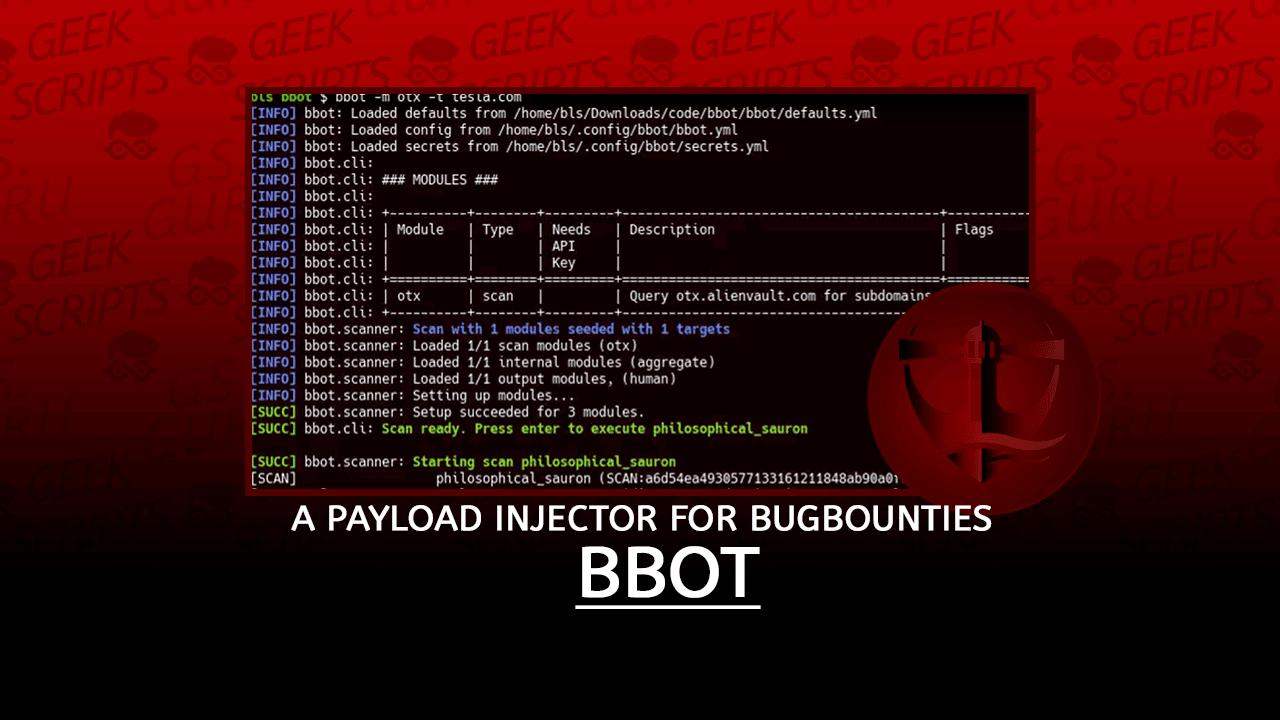BBOT is a modular, recursive OSINT framework that can execute the entire OSINT workflow in a single command.
BBOT is inspired by Spiderfoot but takes it to the next level with features like multi-target scans, lightning-fast asyncio performance, and NLP-powered subdomain mutations. It offers a wide range of functionality, including subdomain enumeration, port scanning, web screenshots, vulnerability scanning, and much more.
BBOT typically outperforms other subdomain enumeration tools by 20-25%. To learn how this is possible, see How It Works.
Installation (pip)
For more installation methods including Docker, see Installation.
# Prerequisites:
# - Linux (Windows and macOS are *not* supported)
# - Python 3.9 or newer
# stable version
pipx install bbot
# bleeding edge (dev branch)
pipx install --pip-args '\--pre' bbot
bbot --help
Example Commands
Scan output, logs, etc. are saved to ~/.bbot. For more detailed examples and explanations, see Scanning.
Subdomains:
# Perform a full subdomain enumeration on evilcorp.com
bbot -t evilcorp.com -f subdomain-enumSubdomains (passive only):
# Perform a passive-only subdomain enumeration on evilcorp.com
bbot -t evilcorp.com -f subdomain-enum -rf passiveSubdomains + port scan + web screenshots:
# Port-scan every subdomain, screenshot every webpage, output to current directory
bbot -t evilcorp.com -f subdomain-enum -m nmap gowitness -n my_scan -o .Subdomains + basic web scan:
# A basic web scan includes wappalyzer, robots.txt, and other non-intrusive web modules
bbot -t evilcorp.com -f subdomain-enum web-basicWeb spider:
# Crawl www.evilcorp.com up to a max depth of 2, automatically extracting emails, secrets, etc.
bbot -t www.evilcorp.com -m httpx robots badsecrets secretsdb -c web_spider_distance=2 web_spider_depth=2Everything everywhere all at once:
# Subdomains, emails, cloud buckets, port scan, basic web, web screenshots, nuclei
bbot -t evilcorp.com -f subdomain-enum email-enum cloud-enum web-basic -m nmap gowitness nuclei --allow-deadlyTargets
BBOT accepts an unlimited number of targets. You can specify targets either directly on the command line or in files (or both!). Targets can be any of the following:
DNS_NAME(evilcorp.com)IP_ADDRESS(1.2.3.4)IP_RANGE(1.2.3.0/24)OPEN_TCP_PORT(192.168.0.1:80)URL(https://www.evilcorp.com)
For more information, see Targets. To learn how BBOT handles scope, see Scope.
BBOT as a Python library
Synchronous
from bbot.scanner import Scanner
# any number of targets can be specified
scan = Scanner("example.com", "scanme.nmap.org", modules=["nmap", "sslcert"])
for event in scan.start():
print(event.json())Asynchronous
from bbot.scanner import Scanner
async def main():
scan = Scanner("example.com", "scanme.nmap.org", modules=["nmap", "sslcert"])
async for event in scan.async_start():
print(event.json())
import asyncio
asyncio.run(main())
